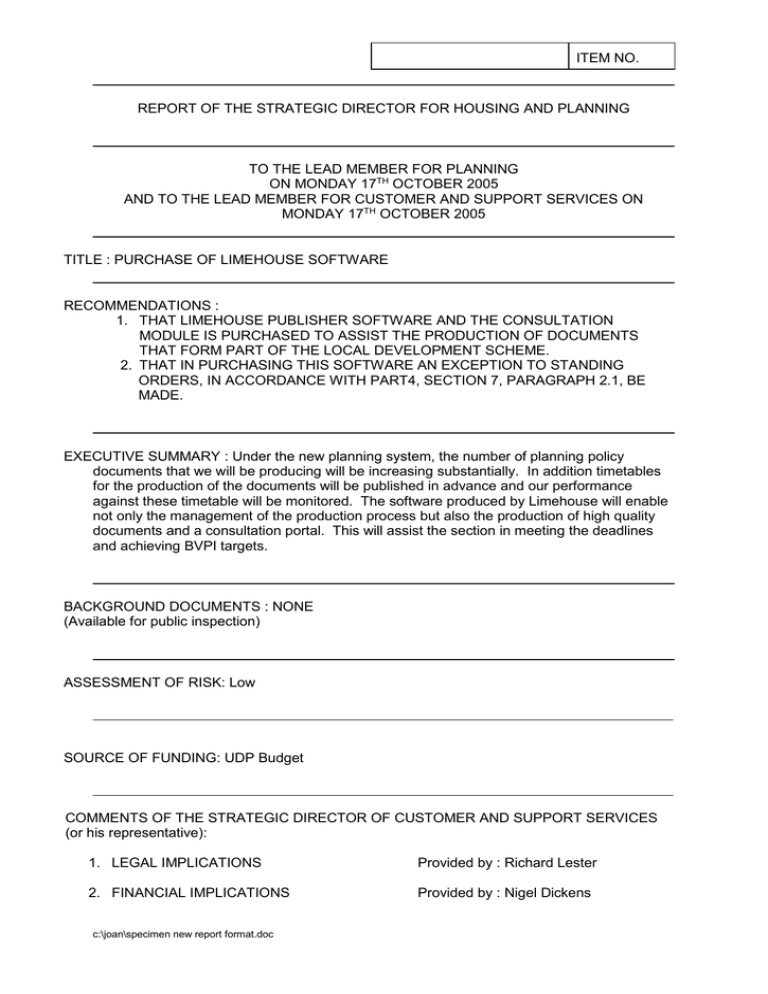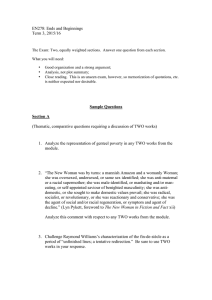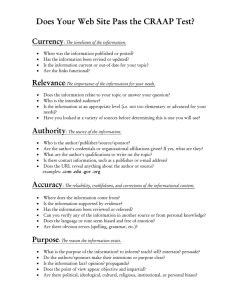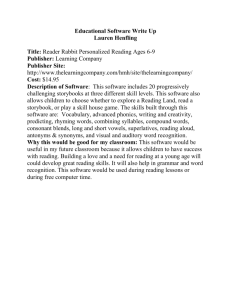ITEM NO. REPORT OF THE STRATEGIC DIRECTOR FOR HOUSING AND PLANNING
advertisement

ITEM NO. REPORT OF THE STRATEGIC DIRECTOR FOR HOUSING AND PLANNING TO THE LEAD MEMBER FOR PLANNING ON MONDAY 17TH OCTOBER 2005 AND TO THE LEAD MEMBER FOR CUSTOMER AND SUPPORT SERVICES ON MONDAY 17TH OCTOBER 2005 TITLE : PURCHASE OF LIMEHOUSE SOFTWARE RECOMMENDATIONS : 1. THAT LIMEHOUSE PUBLISHER SOFTWARE AND THE CONSULTATION MODULE IS PURCHASED TO ASSIST THE PRODUCTION OF DOCUMENTS THAT FORM PART OF THE LOCAL DEVELOPMENT SCHEME. 2. THAT IN PURCHASING THIS SOFTWARE AN EXCEPTION TO STANDING ORDERS, IN ACCORDANCE WITH PART4, SECTION 7, PARAGRAPH 2.1, BE MADE. EXECUTIVE SUMMARY : Under the new planning system, the number of planning policy documents that we will be producing will be increasing substantially. In addition timetables for the production of the documents will be published in advance and our performance against these timetable will be monitored. The software produced by Limehouse will enable not only the management of the production process but also the production of high quality documents and a consultation portal. This will assist the section in meeting the deadlines and achieving BVPI targets. BACKGROUND DOCUMENTS : NONE (Available for public inspection) ASSESSMENT OF RISK: Low SOURCE OF FUNDING: UDP Budget COMMENTS OF THE STRATEGIC DIRECTOR OF CUSTOMER AND SUPPORT SERVICES (or his representative): 1. LEGAL IMPLICATIONS Provided by : Richard Lester 2. FINANCIAL IMPLICATIONS Provided by : Nigel Dickens c:\joan\specimen new report format.doc PROPERTY (if applicable): N/A HUMAN RESOURCES (if applicable): N/A CONTACT OFFICER : ALISON PARTINGTON 793 3780 WARD(S) TO WHICH REPORT RELATE(S): NONE KEY COUNCIL POLICIES: DETAILS (Continued Overleaf) 1.0 Background 1.1 The introduction of the new planning system is radically transforming the way planning policy documents are produced. The move to a Local Development Framework (LDF) will result in the production of a whole suite of documents rather than the production of a single document every 5-10 years. 1.2 The current Local Development Scheme (LDS) identifies 16 different documents whose production will be commenced within the next 3 years and there are a large number of other documents already identified as necessary for production once resources allow it. Consequently it is envisaged that this level of document production will be maintained for the foreseeable future. 1.3 The production of documents that will form part of the LDF will need to be carefully managed. The LDS identifies production timetables for all the documents and the Council’s performance against these timetables will be monitored annually. It will be a key indicator for Planning Delivery Grant, Best Value and CPA. 2.0 Limehouse Publisher 2.1 A presentation was recently given to planning officers across Greater Manchester of a software product called Limehouse Publisher. Two further presentations have been given to Salford staff, one to a number of planning policy staff and the second to more ‘technical’ staff, including graphics, IT, the web team and the e-governance officer. 2.2 Limehouse Publisher has been developed to manage the authoring of large structured Local Authority documents. The system has many features but they can largely be broken into three major areas: Document Project Management and Content Workflow Multiple Format Publishing Consultation Portal c:\joan\specimen new report format.doc 2.3 Document Project Management and Content Workflow The system works by allowing a document administrator to define a structure (or outline) for the publication, the content of which can then be split up and assigned to a number of users for completion. Publisher is used by the administrator to manage these document sections by imposing a structured workflow on them making sure that each section goes through the necessary departmental approval before they are submitted for addition to the final corporate publication. Each User has a ‘Task Manager’ that displays exactly what they need to do in the plan and when they need to get it done by. When Users are assigned work to do they are sent a notification e-mail with step-by-step instructions as to how to contribute or approve content. Typically the User can follow the instructions and be proficient within 5-10 minutes. Whilst the contributors/approvers are working on each section, the administrator can monitor their progress. This can be handled at a macro level where the administrator can obtain a visual snapshot of how the plan is progressing as a whole. Alternatively the administrator can drill down to view the content, history etc of each section. The result of these features is a large amount of time (and therefore money) saved in collating and project managing the content of large plans. This, and the instant publishing features mentioned below, also significantly reduces the very large amounts of stress that can build up meeting deadlines for plan submission. 2.4 Multiple Format Publishing The content authored by anyone using the system is saved in XML format. From this central source of information the plan can be published into multiple formats. 1. 2. 3. PDF version. The PDFs produced by the system are built to be either high resolution for print or low resolution for electronic viewing. Each PDF can be stylised to be compliant with corporate brand guidelines and negate the need for sending the plan to designers. This has four major benefits. Cost. The design of a plan can be expensive. Time. A designer will require anywhere between 2-4 weeks to design a plan of this size. With the Limehouse Publisher it is possible to produce the ‘finished’ look PDF version of the plan within seconds. This is a large amount of time saved. Format. A common format will be developed either by Graphics or Limehouse which will then be applied to all the documents. This will not only minimise the time spent designing and formatting the documents but ensure all the documents have a common style which will help to show that they form part of a suite of documents. Control. If mistakes are spotted in either the content or design of the plan, the council will need to go back to the designer with the amendments which the designer has to amend in their designed version of the plan. This is inefficient and can be expensive if the designer charges for corrections. HTML version. The HTML produced by the system is all W3C AAA compliant which meets the government guidelines for producing information on the internet. Our web team have advised that the output will be suitable for our web site. CD-Rom version. The system produces an auto running CD-Rom version of the plan that can be burned onto CD. This has the advantage of reducing the print c:\joan\specimen new report format.doc run required and reducing the per unit costs of distributing the plan – CDs are less expensive to produce and smaller and lighter to distribute. Other benefits of this publishing facility is the ability to visualise exactly how the plan is going to look when finalised right at the very start of the process. This helps not just the administrator of the plan and users but also other stakeholders in the plan such as members. The new consultation based facilities of the system also enable collating of comments from relevant stakeholders. 2.5 Consultation Portal The consultation portal enables documents published through Limehouse Publisher to be placed on the internet to enable the general public and other interested parties to view it online and provides facilities so that they are able to make comments specific to parts of the document i.e. chapters, sections, policies and statements or the entire document. The portal allows administrators to review these representations and also to produce a variety of reports on the representation data. This will help overcome some of the problems we currently face in enabling online representations (e.g. having to separately enter contact details for each representation that is made). 2.6 The software can also help local authorities achieve an excellent rating in a number of the PARSOL standards for e-planning delivery. These are set out below. Standard 9 – The local development scheme is available online. With Limehouse Publisher users can include interactive links from the LDS to constituent documents and external support material giving an excellent grading in this standard. Standard 10 – Forward planning documentation including development plans, development frameworks and supporting documents can be viewed online With Limehouse Publisher members of the public and other interested parties can view and request specific information or updates on all publicly available forward planning documentation from a fully searchable interactive web based format. With Limehouse Publisher’s standard PDF & HTML outputs, users can be given the choice of viewing format, increasing the accessibility of documentation. It can also link from the online maps to the relevant policies, giving an excellent grading. Standard 11 – Members of the Public and other interested parties can comment on key publicly available documents online Limehouse Publisher will enable members of the public and other interested parties to submit comments online. Comments received online are automatically uploaded to a database and an automated receipt of confirmation returned. These comments are also available for viewing post consultation and updates as to the outcome of comments can be posted online. This, along with the ability to respond to individual comments directly, will give an excellent grading. Standard 12 – There is proactive online consultation with stakeholders on current development documents Using Limehouse Publisher will allow the adoption of a proactive approach to consulting members of the public and other interested parties using email lists gathered within the Limehouse Publisher Consultation Module, giving an excellent grading. c:\joan\specimen new report format.doc 2.7 Limehouse Publisher is designed specifically for local authorities and is currently used by a growing number of authorities ranging from some of the smallest district councils e.g. Wycombe DC, Waverley DC right up to the largest local authorities in the country e.g. Lancashire CC, Kent CC. In Greater Manchester it is currently used by Stockport MBC and the GMJTT for the production of the LTP and has just been purchased by Manchester City Council. 3.0 Practicalities and Costs 3.1 The system consists of an administrator (who assigns tasks), approvers approve submissions) and task completers. A license is required for administrator, which applies to one computer. An administrator can run as documents as they like simultaneously under the terms of the licence. For individuals to whom tasks are assigned (approvers or completers), there additional license cost. 3.2 The cost of the first administrator licence in any given department (one off) is £15,000. Any additional administrator licence, for use in the same department (one off) is £7,000. Included in the cost is the design for 2 standard PDF and one standard html template and free support and free updates in year 1. Remote installation and testing is also included free of charge. 3.3 The consultation module is sold as an optional extra and costs £12,000. 3.4 Support is free in the first year. Each year thereafter there is a renewal fee on both the administrator software and the consultation module of 22%. This covers ongoing technical support and free updates. 3.5 The software needs to be hosted on a server. This can be an internal server or it can be hosted on a Limehouse server. Should we require Limehouse to host the system the cost is £150 per calendar month, payable yearly in advance for up to 5 GB worth of data storage. Their cost for hosting the consultation module is £100 per calendar month payable in advance for up to 3 GB worth of data storage. 3.6 If we were to host the system internally it would require the purchase of a new server. The cost of purchasing this and setting it up would be £5,000 and the annual ongoing maintenance costs thereafter would be £100. 3.7 The company however offer the following package which offers greater value for money than when the component parts are purchased simultaneously. Cost in year one - £25,000 which includes 1 X Limehouse Publisher Administrator Licence 1 X Limehouse Publisher Consultant Licence 2 X Day training Hosting for Limehouse Publisher Core System Hosting for Limehouse Consultant Module Technical Support and Updates Design of 2 PDF templates and one HTML template Cost in Year two - £6500 which includes Ongoing Technical Support and Updates Ongoing Hosting for Limehouse Publisher Core System Ongoing Hosting for Limehouse Consultant Module c:\joan\specimen new report format.doc (who each many those is no (Normal Pricing for the above would be £32,000 in year one and £8940 per annum thereafter) 3.8 If we were to purchase a server and host the system internally, there would be no reduction in the initial purchase cost of the package and the ongoing annual costs would only be £2-300 cheaper. This is due to the fact that the package is heavily discounted already in comparison to purchasing the items individually. As a result there is no financial benefit in pursuing this option. 3.9 The IT section, Graphics and the web team have all attended a presentation by Limehouse and therefore have been able to discuss the technical side of the software. They have all confirmed that the software would be compatible with our current systems 4.0 Alternative Software 4.1 When considering the purchase of Limehouse Software, Stockport MBC attempted to identify other products that might be able to reproduce such functionality. On the project management side there are tools such as MS Project and a number of webbased tools that mimic MS Project features. There are workflow tools in many webbased applications but they are not combined with project management or multiple format publishing capabilities. 4.2 Microsoft Sharepoint is a web-based document management system which enables end users to look at and alter documents, and tracks their changes. Sharepoint allows the display of the structure and contents of the documents, makes it available for editing, and tracks alterations. However it does not offer any control over task assignment, content approval or publishing. It therefore does not provide any management of the document structure. 4.3 On a multiple format publishing side, Stockport MBC were unable to find a system that could meet the requirements both in the designs of the PDF’s that could be created and in the ability to create W3C AAA compliant HTML. 4.4 When Leeds City Council were considering purchasing the system they attempted to tender the system. They placed adverts on a number of Government approved procurement lists and did not receive a single response. 4.5 There is therefore clear evidence that there are no alternative solutions on the market that provide the comprehensive range of functions that Limehouse Publisher would provide. 4.6 Standing Orders would normally require written quotations to be sought from a minimum of 3 firms, however in the light of the above it is recommended that the purchase of this software be exempt from standing orders as it is currently a unique product. 5.0 Recommendations 5.1 It is recommended that Limehouse Publisher and the Consultation module is purchased to assist in the production and publishing of Local Development Documents at a cost of £25,000 for the licences and £6,500 for annual maintenance thereafter. In the purchase of this software it is recommended that an exception to standing orders, in accordance with part 4, section 7, paragraph 2.1, be made. Malcolm Sykes Strategic Director Housing and Planning c:\joan\specimen new report format.doc




